Legal Regulation and Compliance Lab Report: Hepting v. AT&T
VerifiedAdded on 2021/10/29
|8
|1317
|52
Report
AI Summary
This lab report provides a detailed analysis of legal regulation and compliance, focusing on privacy law and its violations. It examines the Electronic Frontier Foundation's (EFF) mission to protect privacy rights and its involvement in the Hepting v. AT&T case, where the telecommunication company and the National Security Agency (NSA) were accused of illegal wiretapping and data mining. The report discusses the privacy issues, the legal implications of such violations, and the relevant laws, including the First, Fourth, and Fourteenth Amendments of the U.S. Constitution, as well as the Foreign Intelligence Surveillance Act (FISA). It highlights the challenges to privacy in the face of national security concerns and the ongoing efforts by the EFF to challenge government overreach and protect citizens' rights. The report also references related cases and the Supreme Court's decisions on privacy rights.
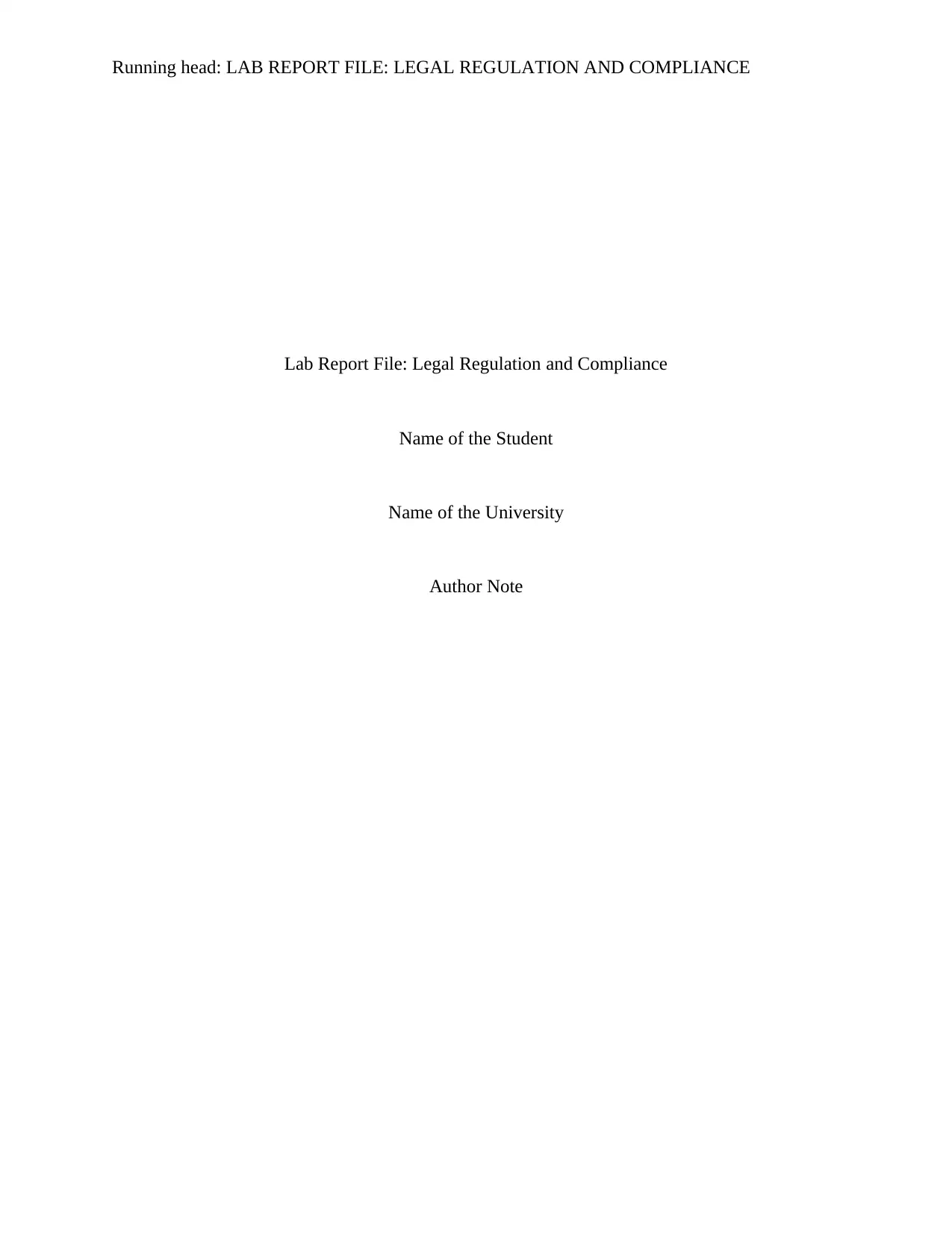
Running head: LAB REPORT FILE: LEGAL REGULATION AND COMPLIANCE
Lab Report File: Legal Regulation and Compliance
Name of the Student
Name of the University
Author Note
Lab Report File: Legal Regulation and Compliance
Name of the Student
Name of the University
Author Note
Paraphrase This Document
Need a fresh take? Get an instant paraphrase of this document with our AI Paraphraser
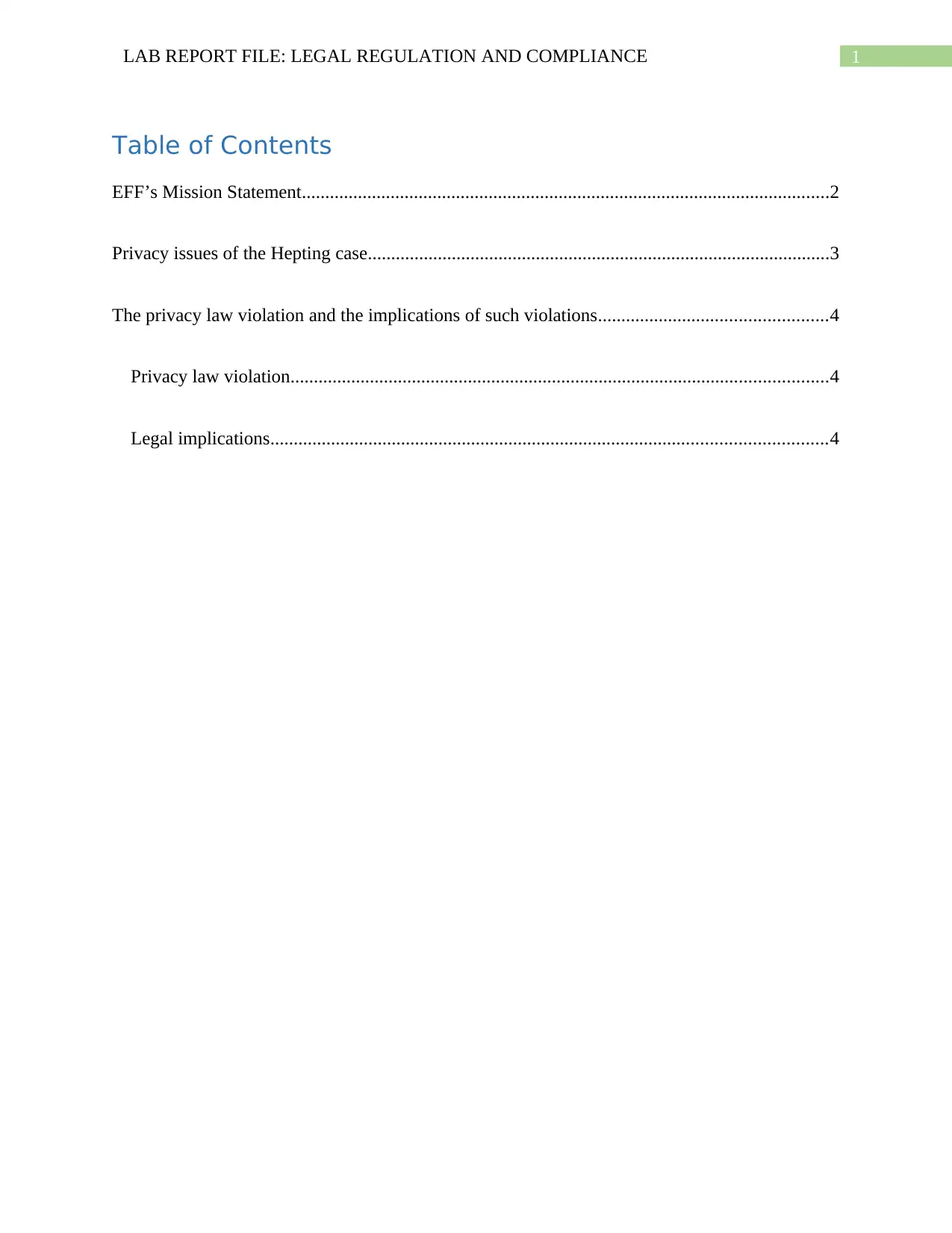
1LAB REPORT FILE: LEGAL REGULATION AND COMPLIANCE
Table of Contents
EFF’s Mission Statement.................................................................................................................2
Privacy issues of the Hepting case...................................................................................................3
The privacy law violation and the implications of such violations.................................................4
Privacy law violation...................................................................................................................4
Legal implications.......................................................................................................................4
Table of Contents
EFF’s Mission Statement.................................................................................................................2
Privacy issues of the Hepting case...................................................................................................3
The privacy law violation and the implications of such violations.................................................4
Privacy law violation...................................................................................................................4
Legal implications.......................................................................................................................4
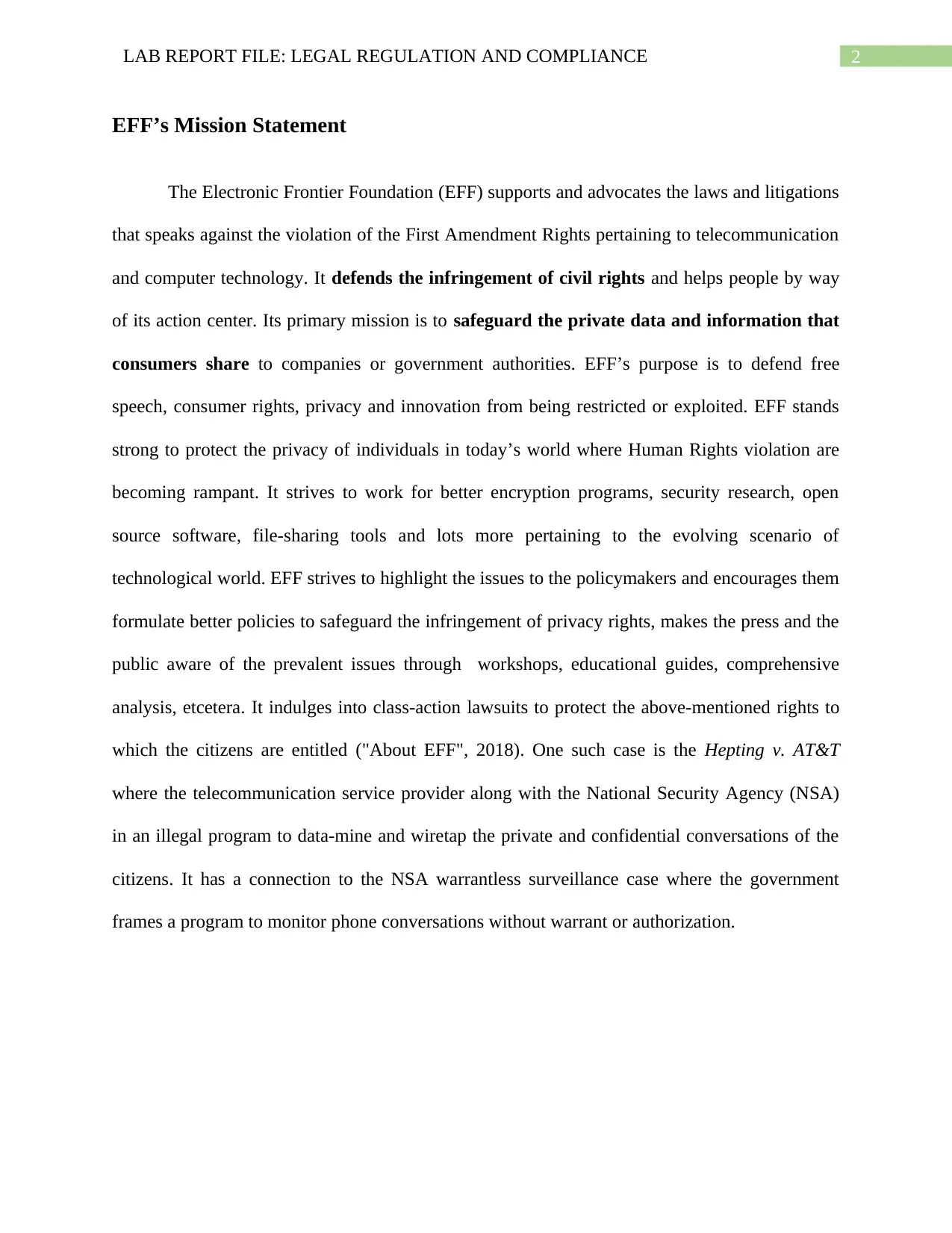
2LAB REPORT FILE: LEGAL REGULATION AND COMPLIANCE
EFF’s Mission Statement
The Electronic Frontier Foundation (EFF) supports and advocates the laws and litigations
that speaks against the violation of the First Amendment Rights pertaining to telecommunication
and computer technology. It defends the infringement of civil rights and helps people by way
of its action center. Its primary mission is to safeguard the private data and information that
consumers share to companies or government authorities. EFF’s purpose is to defend free
speech, consumer rights, privacy and innovation from being restricted or exploited. EFF stands
strong to protect the privacy of individuals in today’s world where Human Rights violation are
becoming rampant. It strives to work for better encryption programs, security research, open
source software, file-sharing tools and lots more pertaining to the evolving scenario of
technological world. EFF strives to highlight the issues to the policymakers and encourages them
formulate better policies to safeguard the infringement of privacy rights, makes the press and the
public aware of the prevalent issues through workshops, educational guides, comprehensive
analysis, etcetera. It indulges into class-action lawsuits to protect the above-mentioned rights to
which the citizens are entitled ("About EFF", 2018). One such case is the Hepting v. AT&T
where the telecommunication service provider along with the National Security Agency (NSA)
in an illegal program to data-mine and wiretap the private and confidential conversations of the
citizens. It has a connection to the NSA warrantless surveillance case where the government
frames a program to monitor phone conversations without warrant or authorization.
EFF’s Mission Statement
The Electronic Frontier Foundation (EFF) supports and advocates the laws and litigations
that speaks against the violation of the First Amendment Rights pertaining to telecommunication
and computer technology. It defends the infringement of civil rights and helps people by way
of its action center. Its primary mission is to safeguard the private data and information that
consumers share to companies or government authorities. EFF’s purpose is to defend free
speech, consumer rights, privacy and innovation from being restricted or exploited. EFF stands
strong to protect the privacy of individuals in today’s world where Human Rights violation are
becoming rampant. It strives to work for better encryption programs, security research, open
source software, file-sharing tools and lots more pertaining to the evolving scenario of
technological world. EFF strives to highlight the issues to the policymakers and encourages them
formulate better policies to safeguard the infringement of privacy rights, makes the press and the
public aware of the prevalent issues through workshops, educational guides, comprehensive
analysis, etcetera. It indulges into class-action lawsuits to protect the above-mentioned rights to
which the citizens are entitled ("About EFF", 2018). One such case is the Hepting v. AT&T
where the telecommunication service provider along with the National Security Agency (NSA)
in an illegal program to data-mine and wiretap the private and confidential conversations of the
citizens. It has a connection to the NSA warrantless surveillance case where the government
frames a program to monitor phone conversations without warrant or authorization.
⊘ This is a preview!⊘
Do you want full access?
Subscribe today to unlock all pages.

Trusted by 1+ million students worldwide
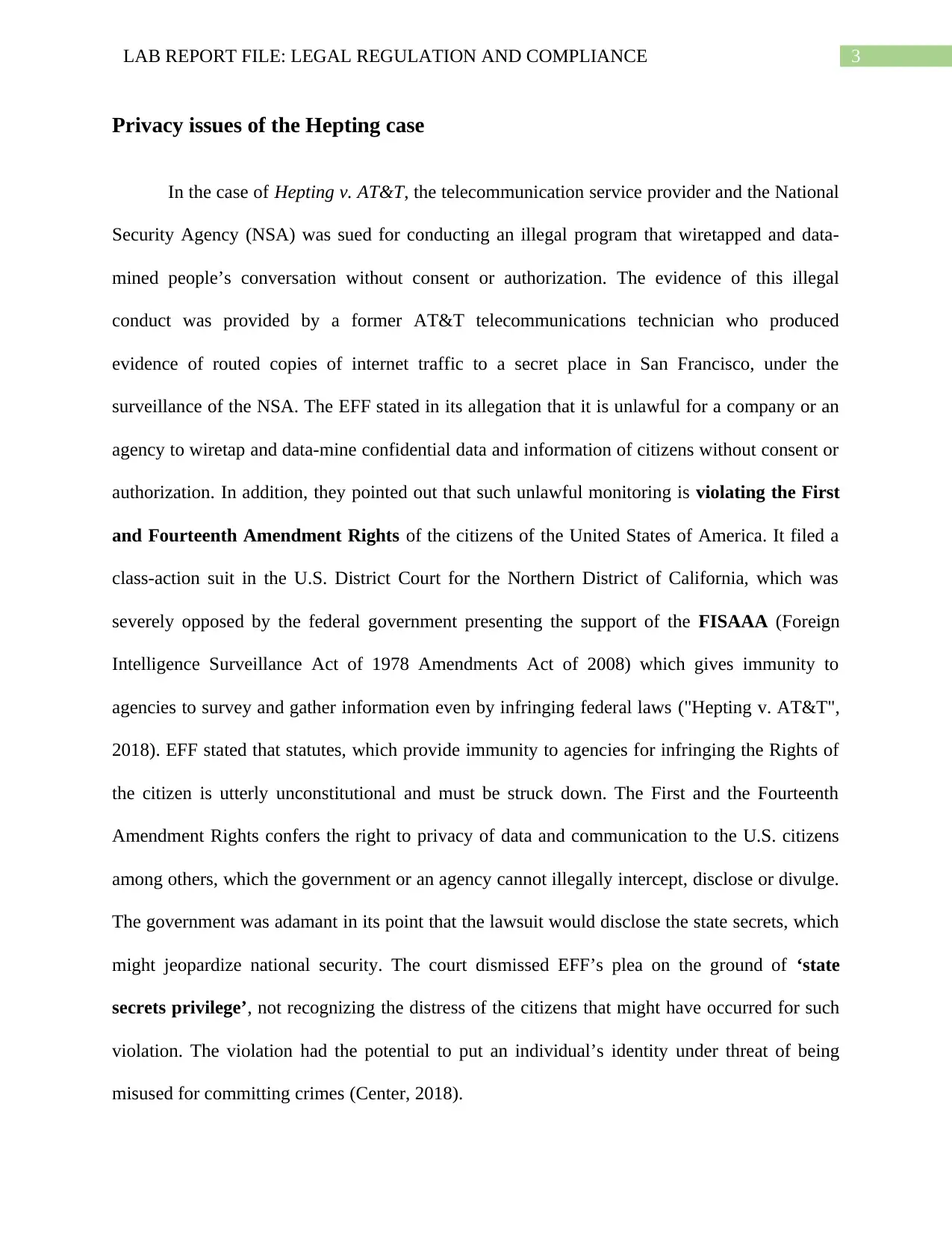
3LAB REPORT FILE: LEGAL REGULATION AND COMPLIANCE
Privacy issues of the Hepting case
In the case of Hepting v. AT&T, the telecommunication service provider and the National
Security Agency (NSA) was sued for conducting an illegal program that wiretapped and data-
mined people’s conversation without consent or authorization. The evidence of this illegal
conduct was provided by a former AT&T telecommunications technician who produced
evidence of routed copies of internet traffic to a secret place in San Francisco, under the
surveillance of the NSA. The EFF stated in its allegation that it is unlawful for a company or an
agency to wiretap and data-mine confidential data and information of citizens without consent or
authorization. In addition, they pointed out that such unlawful monitoring is violating the First
and Fourteenth Amendment Rights of the citizens of the United States of America. It filed a
class-action suit in the U.S. District Court for the Northern District of California, which was
severely opposed by the federal government presenting the support of the FISAAA (Foreign
Intelligence Surveillance Act of 1978 Amendments Act of 2008) which gives immunity to
agencies to survey and gather information even by infringing federal laws ("Hepting v. AT&T",
2018). EFF stated that statutes, which provide immunity to agencies for infringing the Rights of
the citizen is utterly unconstitutional and must be struck down. The First and the Fourteenth
Amendment Rights confers the right to privacy of data and communication to the U.S. citizens
among others, which the government or an agency cannot illegally intercept, disclose or divulge.
The government was adamant in its point that the lawsuit would disclose the state secrets, which
might jeopardize national security. The court dismissed EFF’s plea on the ground of ‘state
secrets privilege’, not recognizing the distress of the citizens that might have occurred for such
violation. The violation had the potential to put an individual’s identity under threat of being
misused for committing crimes (Center, 2018).
Privacy issues of the Hepting case
In the case of Hepting v. AT&T, the telecommunication service provider and the National
Security Agency (NSA) was sued for conducting an illegal program that wiretapped and data-
mined people’s conversation without consent or authorization. The evidence of this illegal
conduct was provided by a former AT&T telecommunications technician who produced
evidence of routed copies of internet traffic to a secret place in San Francisco, under the
surveillance of the NSA. The EFF stated in its allegation that it is unlawful for a company or an
agency to wiretap and data-mine confidential data and information of citizens without consent or
authorization. In addition, they pointed out that such unlawful monitoring is violating the First
and Fourteenth Amendment Rights of the citizens of the United States of America. It filed a
class-action suit in the U.S. District Court for the Northern District of California, which was
severely opposed by the federal government presenting the support of the FISAAA (Foreign
Intelligence Surveillance Act of 1978 Amendments Act of 2008) which gives immunity to
agencies to survey and gather information even by infringing federal laws ("Hepting v. AT&T",
2018). EFF stated that statutes, which provide immunity to agencies for infringing the Rights of
the citizen is utterly unconstitutional and must be struck down. The First and the Fourteenth
Amendment Rights confers the right to privacy of data and communication to the U.S. citizens
among others, which the government or an agency cannot illegally intercept, disclose or divulge.
The government was adamant in its point that the lawsuit would disclose the state secrets, which
might jeopardize national security. The court dismissed EFF’s plea on the ground of ‘state
secrets privilege’, not recognizing the distress of the citizens that might have occurred for such
violation. The violation had the potential to put an individual’s identity under threat of being
misused for committing crimes (Center, 2018).
Paraphrase This Document
Need a fresh take? Get an instant paraphrase of this document with our AI Paraphraser
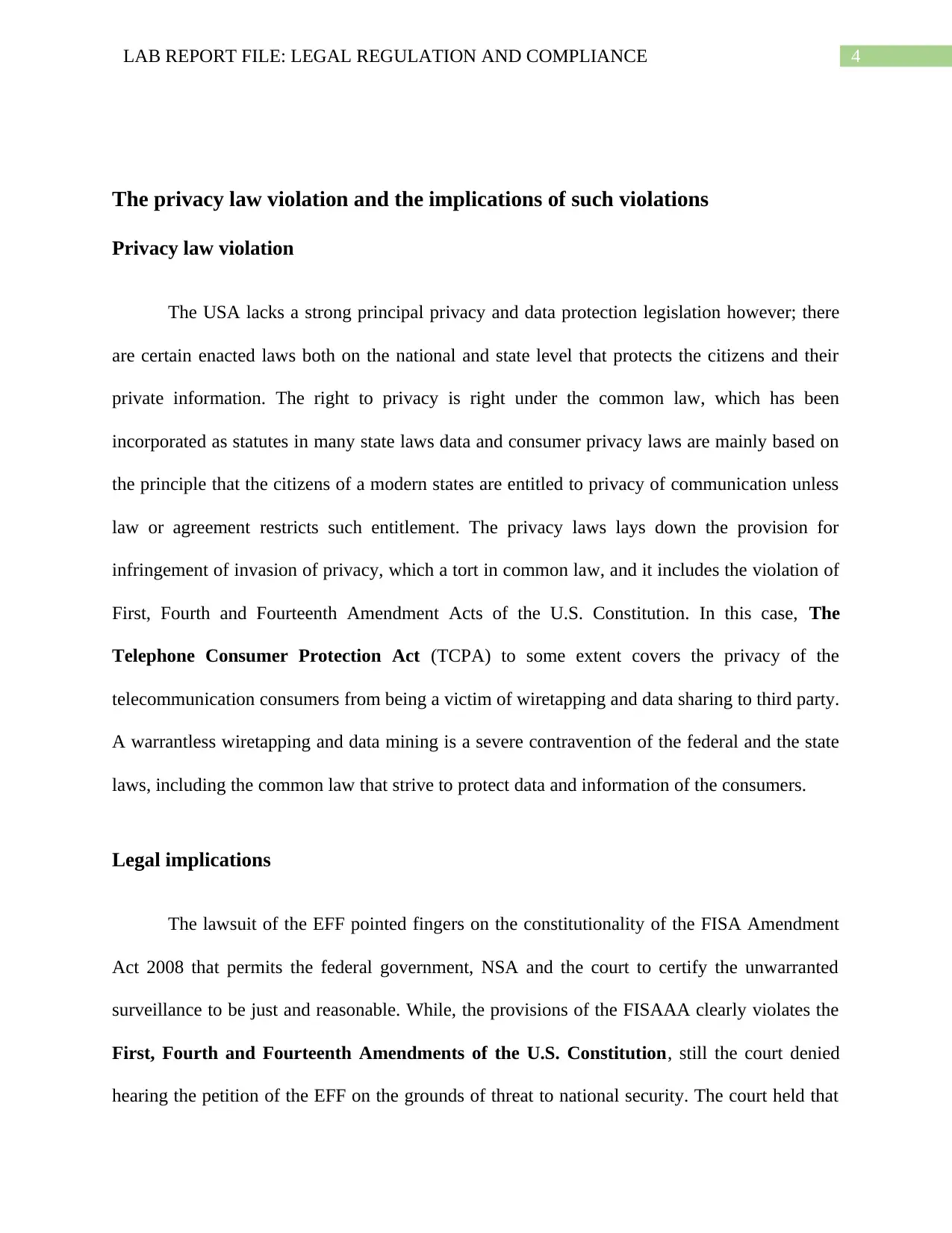
4LAB REPORT FILE: LEGAL REGULATION AND COMPLIANCE
The privacy law violation and the implications of such violations
Privacy law violation
The USA lacks a strong principal privacy and data protection legislation however; there
are certain enacted laws both on the national and state level that protects the citizens and their
private information. The right to privacy is right under the common law, which has been
incorporated as statutes in many state laws data and consumer privacy laws are mainly based on
the principle that the citizens of a modern states are entitled to privacy of communication unless
law or agreement restricts such entitlement. The privacy laws lays down the provision for
infringement of invasion of privacy, which a tort in common law, and it includes the violation of
First, Fourth and Fourteenth Amendment Acts of the U.S. Constitution. In this case, The
Telephone Consumer Protection Act (TCPA) to some extent covers the privacy of the
telecommunication consumers from being a victim of wiretapping and data sharing to third party.
A warrantless wiretapping and data mining is a severe contravention of the federal and the state
laws, including the common law that strive to protect data and information of the consumers.
Legal implications
The lawsuit of the EFF pointed fingers on the constitutionality of the FISA Amendment
Act 2008 that permits the federal government, NSA and the court to certify the unwarranted
surveillance to be just and reasonable. While, the provisions of the FISAAA clearly violates the
First, Fourth and Fourteenth Amendments of the U.S. Constitution, still the court denied
hearing the petition of the EFF on the grounds of threat to national security. The court held that
The privacy law violation and the implications of such violations
Privacy law violation
The USA lacks a strong principal privacy and data protection legislation however; there
are certain enacted laws both on the national and state level that protects the citizens and their
private information. The right to privacy is right under the common law, which has been
incorporated as statutes in many state laws data and consumer privacy laws are mainly based on
the principle that the citizens of a modern states are entitled to privacy of communication unless
law or agreement restricts such entitlement. The privacy laws lays down the provision for
infringement of invasion of privacy, which a tort in common law, and it includes the violation of
First, Fourth and Fourteenth Amendment Acts of the U.S. Constitution. In this case, The
Telephone Consumer Protection Act (TCPA) to some extent covers the privacy of the
telecommunication consumers from being a victim of wiretapping and data sharing to third party.
A warrantless wiretapping and data mining is a severe contravention of the federal and the state
laws, including the common law that strive to protect data and information of the consumers.
Legal implications
The lawsuit of the EFF pointed fingers on the constitutionality of the FISA Amendment
Act 2008 that permits the federal government, NSA and the court to certify the unwarranted
surveillance to be just and reasonable. While, the provisions of the FISAAA clearly violates the
First, Fourth and Fourteenth Amendments of the U.S. Constitution, still the court denied
hearing the petition of the EFF on the grounds of threat to national security. The court held that
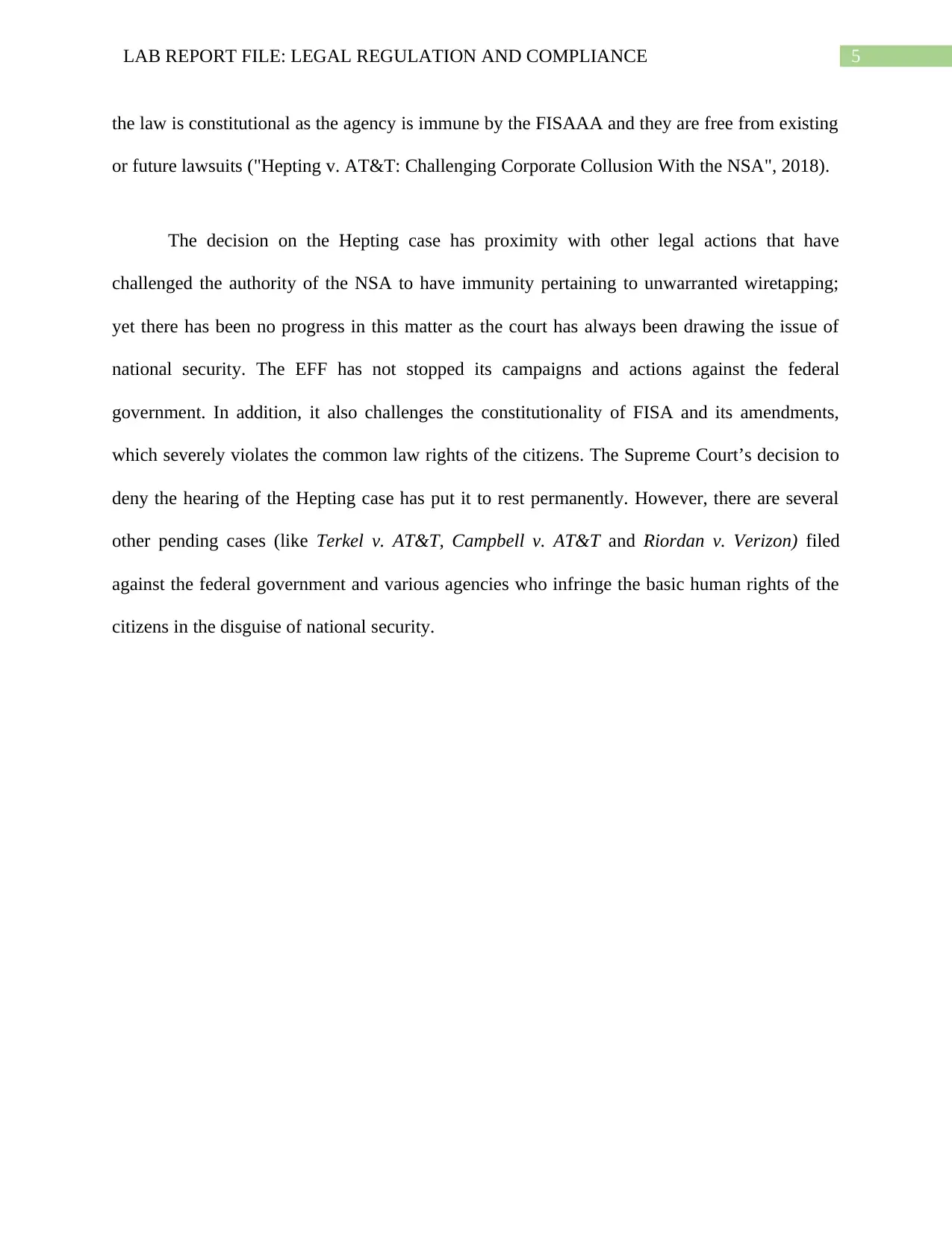
5LAB REPORT FILE: LEGAL REGULATION AND COMPLIANCE
the law is constitutional as the agency is immune by the FISAAA and they are free from existing
or future lawsuits ("Hepting v. AT&T: Challenging Corporate Collusion With the NSA", 2018).
The decision on the Hepting case has proximity with other legal actions that have
challenged the authority of the NSA to have immunity pertaining to unwarranted wiretapping;
yet there has been no progress in this matter as the court has always been drawing the issue of
national security. The EFF has not stopped its campaigns and actions against the federal
government. In addition, it also challenges the constitutionality of FISA and its amendments,
which severely violates the common law rights of the citizens. The Supreme Court’s decision to
deny the hearing of the Hepting case has put it to rest permanently. However, there are several
other pending cases (like Terkel v. AT&T, Campbell v. AT&T and Riordan v. Verizon) filed
against the federal government and various agencies who infringe the basic human rights of the
citizens in the disguise of national security.
the law is constitutional as the agency is immune by the FISAAA and they are free from existing
or future lawsuits ("Hepting v. AT&T: Challenging Corporate Collusion With the NSA", 2018).
The decision on the Hepting case has proximity with other legal actions that have
challenged the authority of the NSA to have immunity pertaining to unwarranted wiretapping;
yet there has been no progress in this matter as the court has always been drawing the issue of
national security. The EFF has not stopped its campaigns and actions against the federal
government. In addition, it also challenges the constitutionality of FISA and its amendments,
which severely violates the common law rights of the citizens. The Supreme Court’s decision to
deny the hearing of the Hepting case has put it to rest permanently. However, there are several
other pending cases (like Terkel v. AT&T, Campbell v. AT&T and Riordan v. Verizon) filed
against the federal government and various agencies who infringe the basic human rights of the
citizens in the disguise of national security.
⊘ This is a preview!⊘
Do you want full access?
Subscribe today to unlock all pages.

Trusted by 1+ million students worldwide
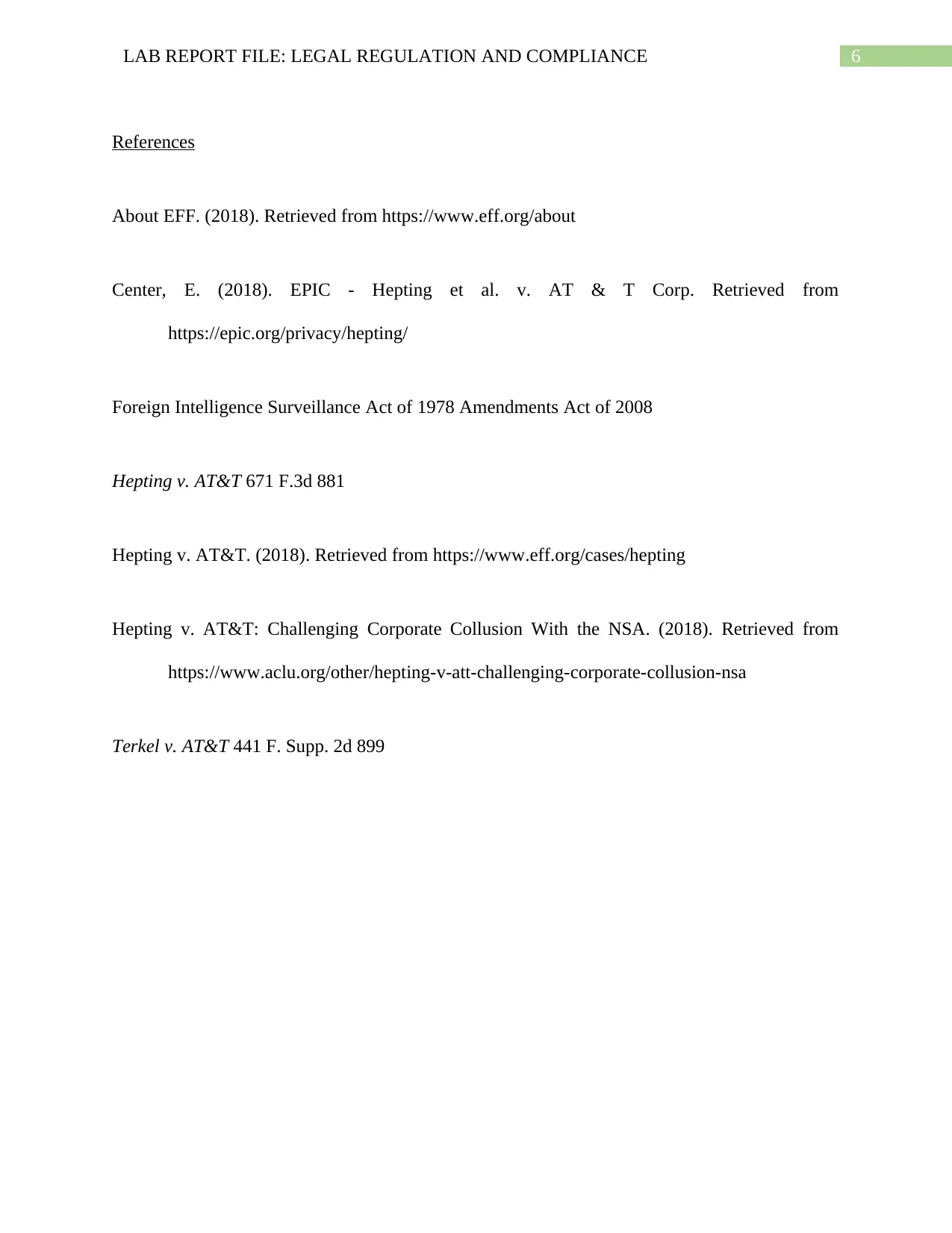
6LAB REPORT FILE: LEGAL REGULATION AND COMPLIANCE
References
About EFF. (2018). Retrieved from https://www.eff.org/about
Center, E. (2018). EPIC - Hepting et al. v. AT & T Corp. Retrieved from
https://epic.org/privacy/hepting/
Foreign Intelligence Surveillance Act of 1978 Amendments Act of 2008
Hepting v. AT&T 671 F.3d 881
Hepting v. AT&T. (2018). Retrieved from https://www.eff.org/cases/hepting
Hepting v. AT&T: Challenging Corporate Collusion With the NSA. (2018). Retrieved from
https://www.aclu.org/other/hepting-v-att-challenging-corporate-collusion-nsa
Terkel v. AT&T 441 F. Supp. 2d 899
References
About EFF. (2018). Retrieved from https://www.eff.org/about
Center, E. (2018). EPIC - Hepting et al. v. AT & T Corp. Retrieved from
https://epic.org/privacy/hepting/
Foreign Intelligence Surveillance Act of 1978 Amendments Act of 2008
Hepting v. AT&T 671 F.3d 881
Hepting v. AT&T. (2018). Retrieved from https://www.eff.org/cases/hepting
Hepting v. AT&T: Challenging Corporate Collusion With the NSA. (2018). Retrieved from
https://www.aclu.org/other/hepting-v-att-challenging-corporate-collusion-nsa
Terkel v. AT&T 441 F. Supp. 2d 899
Paraphrase This Document
Need a fresh take? Get an instant paraphrase of this document with our AI Paraphraser

7LAB REPORT FILE: LEGAL REGULATION AND COMPLIANCE
1 out of 8
Your All-in-One AI-Powered Toolkit for Academic Success.
+13062052269
info@desklib.com
Available 24*7 on WhatsApp / Email
![[object Object]](/_next/static/media/star-bottom.7253800d.svg)
Unlock your academic potential
Copyright © 2020–2026 A2Z Services. All Rights Reserved. Developed and managed by ZUCOL.
